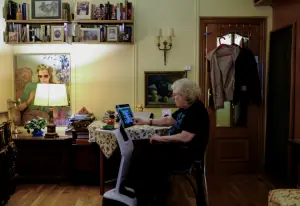Ties and high heels out as hybrid office return sparks casual comfy boom
5 min readBy Corina Pons and Clara-Laeila Laudette
MADRID:Spanish fashionista Blanca Lorca once swore by high heels and fitted clothes for the office, but the COVID-19 lockdown has transformed her style sense and shopping habits.
After months working from her sleek Madrid flat, the 31-year-old pharmaceutical company employee is now dressing in neutral tones and slack fits for her three days a week in the office as a partial return gears up around the world.
Eighteen months in loungewear while remote working during the pandemic have left professionals all over Europe hankering for fresh wardrobes as they embrace hybrid working.
It is a boon for hard-hit retailers.
The focus on comfort may have banished ties, dress shoes and high heels, but it has spurred a new desire for versatile clothing: smart enough for the office, but relaxed enough for kitchen table teleconferences.
Personal apparel sales - including clothing, shoes and cosmetics - actually grew 8.5% in the 12 months leading to August, as increasing mobility and back-to-office mandates boosted shopping, according to official data.
In Britain, over a quarter of people surveyed by workplace consultancy Office Group said they would continue dressing less formally even when back in the office, while almost a third plan to experiment with different styles, according to a Bank of America note.
"After being at home for so long, you prefer comfort, but at the same time you want to be stylish enough to be able to go out," Lorca said, wearing a light shirt and loose-cut trousers as she perused the racks in Zubi, a small boutique in Madrid.
"I look for clothes that will last over time, won't go out of fashion (and) I can use for everything."
PYJAMAS AND ZOOM
Big brands are paying attention.
Retailers such as Zara, Mango and H&M are highlighting "smart casual" trousers, shirts and dresses on their websites, alongside the lounge- and sportswear which lockdowns made ubiquitous.
Many of the leading fashion brands have launched new collections for this unique back-to-work season, as easing restrictions and vaccination campaigns drive mobility.
Department store El Corte Ingles, a household name in Spain, said demand for comfortable officewear surged over the summer, accelerating in September as clients returned to offices and business meetings.
Shops successfully achieving pre-pandemic sales levels the fastest are those selling casual or hybrid workwear, according to analysts and fashion retail sources in London and Madrid, where Europe's high vaccination rates have helped life recover.
Women whose employers mandated partial returns have kept the blouse they would sometimes have worn above pyjama bottoms for Zoom calls, but now pair it with easy trousers and flat shoes, Zubi owner Elena Zubizarreta told Reuters.
Over 78% of Spaniards are fully vaccinated and around 80% of all workers have returned at least part-time, according to a survey by CCOO, the country's largest trade union.
Few, however, have missed the strictures of formal dressing.
Alberto Gavilan, talent director at staffing agency Addeco, said formal attire was now the exception. "Most people will prefer the business casual code, which has proved so effective and comfortable in recent months," he said.
'FASHION HAS CHANGED'
Over half of Spaniards who dressed formally for work pre-pandemic were enthusiastic about buying new clothes for an office return, a June survey by research company Dynata showed - the highest rate among 11 countries surveyed.
The British and Japanese were the least excited, at 19% and 21% each.
Spanish price comparison website Idealo.es said online searches for sport tracksuits dropped 96% from January to August as the vaccination rate increased.
"Fashion has changed and after almost two years away from the workplace you feel like having new things to go back," said communications specialist Valme Pardo, laying boldly-printed dresses, ample tailored trousers and stretchy blazers on her bed at her Madrid home.
Men also crave comfort.
Lucia Danero, a shopping adviser at El Corte Ingles in Madrid, has noticed a stream of customers looking for a refresh: but the men never ask to try on ties anymore.
"Before, it was unthinkable for a man to go to the office with a sweatshirt ... and now we're seeing it," she said, strolling through the aisles and pointing out the jeans businessmen now sought.
'RELAXED CITY'
The trend is global.
International brands Vince, Me+Em, Uniqlo and The White Company, as well as U.S. and UK retailers such as Nordstrom and John Lewis, are dedicating "site space to modern workwear staples, with a strong emphasis... on seasonless pieces to ensure versatility and longevity," trend intelligence agency Stylus said in a recent report.
In fact, despite workplace mobility still sagging 30% below pre-pandemic rates, apparel sales are on average 5% higher in major Western markets, Jefferies bank said in a note to clients in September.
Both physical and online sales at fashion behemoth Inditex were even 9% higher in August and the first week of September than pre-pandemic.
The autumn/winter season has had a strong start, executive chairman of Inditex, Pablo Isla, told a conference, before announcing the next Massimo Dutti collection would be called "Relaxed City".
Yet even as demand recovers, retailers are grappling with disruptions to global supply chains: sales at H&M grew less than expected in the third quarter, before being hampered in September by supply restrictions.
"There's an urge to get 'dressed up' after spending so much time at home... but we've gotten used to being comfortable and we want... garments such as unlined blazers and jackets, wider trousers and intricate knitwear," said Ann-Sofie Johansson, Creative Advisor at H&M.
Backstage at Madrid fashion week, designers bet on new beginnings - which seemed to include bright, non-restrictive dresses and colourful jumpers.
"Heels have been left for very specific moments ... But day-to-day people have gotten rid of them, to be much more comfortable," said Spanish designer Maite Casademunt, whose "Comfy Wild" collection was dominated by dresses, smart loungewear and sports shoes.
For the latest news, follow us on Twitter @Aaj_Urdu. We are also on Facebook, Instagram and YouTube.
























Comments are closed on this story.